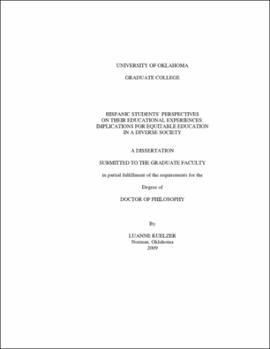| dc.contributor.advisor | Houser, Neil O | |
| dc.creator | Kuelzer, LuAnne | |
| dc.date.accessioned | 2019-04-27T21:35:20Z | |
| dc.date.available | 2019-04-27T21:35:20Z | |
| dc.date.issued | 2009 | |
| dc.identifier | 99318481402042 | |
| dc.identifier.uri | https://hdl.handle.net/11244/319088 | |
| dc.description.abstract | One of the most pressing issues related to our society is the failure of schools to adequately serve minority populations, including Hispanic students. Not only does this situation have harmful consequences for the students, it also negatively affects teachers who work with them and has implications for society at large, as well. In light of this problem, I sought to learn more about the nature of the problem and what could be done about it. I wished to understand the perspectives of Hispanic students regarding their education. Specifically, I wanted to better understand the views of my Hispanic students regarding their own educational and life needs and how they perceived the education they received from United States schools and teachers. My expectation is that these kinds of insights will help foster better understanding and stronger relationships between students and teachers, especially between my students and me. | |
| dc.description.abstract | In this study I explored my own relationship with my Hispanic students as a means to gain insight to not only my own practices. I also wanted to understand the current situation of Hispanic students and the historical problems between people of color and the European American educational system in general. I then considered implications for diverse populations in today's schools, particularly Hispanic students. This study used aspects of critical ethnography, narrative inquiry, and teacher action research to investigate ten purposefully chosen Hispanic students' perspectives concerning their educations. | |
| dc.description.abstract | I employed Noddings' ethic of care and Freire's problem-posing education for raising critical consciousness as my theoretical lenses. The findings suggested the mechanistic, fragmented, and hierarchal structures of dominant culture invisibly affect teachers' and students' relationships which often results in an educational experience of social reproduction. I propose that, through problem-posing education, it may be possible to begin to recognize and transform society's invisible structures. I further suggest that teachers who acknowledge the inequities of dominant culture and help their students become conscious of the invisible inequities through problem-posing education have demonstrated true care. | |
| dc.format.extent | 112 pages | |
| dc.format.medium | application.pdf | |
| dc.language | en_US | |
| dc.relation.requires | Adobe Acrobat Reader | |
| dc.subject | Hispanic Americans--Education--Case studies | |
| dc.subject | Hispanic American students--Oklahoma--Attitudes | |
| dc.subject | Hispanic American teenagers--Oklahoma--Attitudes | |
| dc.title | Hispanic Students' Perspectives on Their Educational Experiencees: Implications for Equitable Education in a Diverse Society | |
| dc.type | text | |
| dc.type | document | |
| dc.thesis.degree | Ph.D. | |
| ou.group | Jeannine Rainbolt College of Education::Department of Instructional Leadership and Academic Curriculum | |

